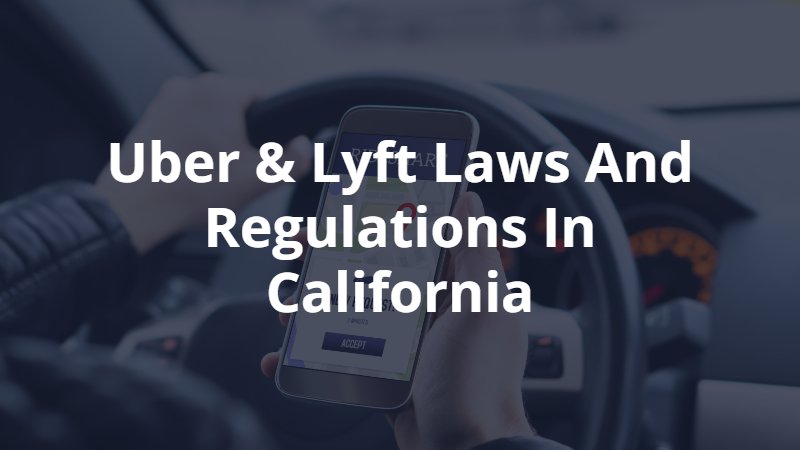As one of the newest types of transportation services, ridesharing has had to undergo several reforms to improve rider safety. This includes the passing of new laws in California that ridesharing companies such as Uber and Lyft must obey. Understanding these laws and regulations can help you know your legal rights as an Uber or Lyft passenger. Speak to an accident attorney in Los Angeles for more information.

Who Can Drive for Uber or Lyft in California?
According to California Public Utilities Code 5445.2, rideshare companies (known as “transportation network companies”) must conduct local and national criminal background checks on drivers before allowing them to accept rides. Background checks must also be conducted annually while the drivers are working for Uber or Lyft.
Drivers with the following criminal histories shall not be permitted to pick up riders:
- Currently registered sex offenders
- Any convictions for violent felonies (California Penal Code Section 667.5)
- Any convictions for false imprisonment or human trafficking (Section 236.1)
- Any convictions for acts of terrorism (Section 11413)
- Any convictions involving weapons of mass destruction (Section 11418)
- Convictions in the last seven years for misdemeanor assault or battery
- Convictions in the last seven years for domestic violence offenses
- Convictions in the last seven years for driving under the influence of drugs or alcohol
All Uber and Lyft drivers must pass the required background checks and have a valid driver’s license issued by the State of California. To improve rider safety, all rideshare passengers have the right to be given a driver’s first name, photograph, an image of the make and model of the vehicle, and the vehicle’s license plate number.
Vehicle and Insurance Requirements
In California, all rideshare vehicles must pass climate emission and smog tests. Every 12 months or 50,000 miles driven, whichever comes first, Uber and Lyft drivers must undergo vehicle inspections. Rideshare drivers must clearly display Lyft and/or Uber decals on the front and back passenger-side windshields of their vehicles while logged onto the app.
Rideshare drivers are required to carry at least the minimum amounts of car insurance that are required of all drivers in California: $15,000 per person and $30,000 per accident for bodily injury insurance and $5,000 for property damage. Under California Public Utilities Code 5433, transportation network companies must also offer at least $1 million in primary insurance for incidents that occur during a ride, which is defined as the period of time after a driver accepts a ride request until the ride is complete and the driver completes the transaction on the platform.
Are Uber and Lyft Drivers in California Employees or Independent Contractors?
In March 2023, Proposition 22 was upheld by state courts in California, which classifies app-based drivers as independent contractors rather than employees of a rideshare company. This law pertains to both rideshare and food-delivery app platforms. Under this ruling, rideshare drivers do not have the same rights and benefits as state employees in California. In exchange, Uber, Lyft, and other app-based drivers preserve their independence as contractors.
This law means that after an Uber or Lyft car accident, it is generally not possible to hold the rideshare company vicariously liable for the mistakes of its driver. Injured accident victims will file claims against a driver’s individual auto insurance policy or – if they qualify – Uber or Lyft’s $1 million policy. Traditional employers, on the other hand, can be held responsible for the actions of their on-duty employees.
If you get injured in a rideshare accident in Los Angeles, contact Panish | Shea | Ravipudi LLP to find out how we can help you seek compensation for your losses.